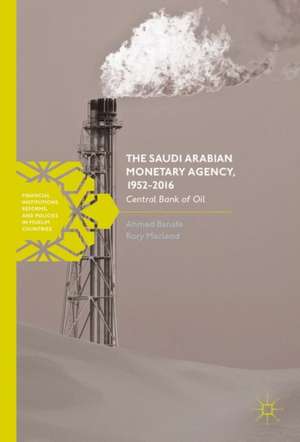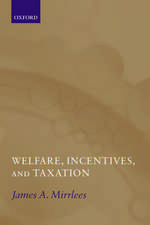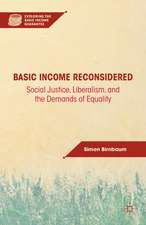The Saudi Arabian Monetary Agency, 1952-2016: Central Bank of Oil: Financial Institutions, Reforms, and Policies in Muslim Countries
Autor Ahmed Banafe, Rory Macleoden Limba Engleză Hardback – 28 iul 2017
Toate formatele și edițiile
| Toate formatele și edițiile | Preț | Express |
|---|---|---|
| Paperback (1) | 687.79 lei 38-44 zile | |
| Springer International Publishing – aug 2018 | 687.79 lei 38-44 zile | |
| Hardback (1) | 732.07 lei 6-8 săpt. | |
| Springer International Publishing – 28 iul 2017 | 732.07 lei 6-8 săpt. |
Preț: 732.07 lei
Preț vechi: 892.77 lei
-18% Nou
Puncte Express: 1098
Preț estimativ în valută:
140.10€ • 152.13$ • 117.68£
140.10€ • 152.13$ • 117.68£
Carte tipărită la comandă
Livrare economică 22 aprilie-06 mai
Preluare comenzi: 021 569.72.76
Specificații
ISBN-13: 9783319552170
ISBN-10: 3319552171
Pagini: 276
Ilustrații: XXI, 330 p. 81 illus.
Dimensiuni: 148 x 210 mm
Greutate: 0.57 kg
Ediția:1st ed. 2017
Editura: Springer International Publishing
Colecția Palgrave Macmillan
Seria Financial Institutions, Reforms, and Policies in Muslim Countries
Locul publicării:Cham, Switzerland
ISBN-10: 3319552171
Pagini: 276
Ilustrații: XXI, 330 p. 81 illus.
Dimensiuni: 148 x 210 mm
Greutate: 0.57 kg
Ediția:1st ed. 2017
Editura: Springer International Publishing
Colecția Palgrave Macmillan
Seria Financial Institutions, Reforms, and Policies in Muslim Countries
Locul publicării:Cham, Switzerland
Cuprins
1. Background to Saudi Arabia’s Financial Challenges.- 2. Discovery of Oil and the Founding of the Saudi Arabian Monetary Agency 1902-52 .- 3. Financial Development Before the First Oil Crisis 1953-74.- 4. Petrodollar Recycling and Saudization of the Banking System 1975-82.- 5. Declining Foreign Exchange Reserves and Iraq’s Invasion of Kuwait 1983-93.- 6. Low Oil Prices, Rising Government Debt, and External Crises 1994-2004.- 7. Impact of the Global Financial Crisis and Its Aftermath 2005-16.- 8. The Future of Gulf Monetary Union.- 9. Foreign Exchange Reserves Management – SAMA’s Experience.- 10. Developing the Domestic Bond Markets.- 11. Currency Regime and Monetary Policy.- 12. SAMA and the International Monetary System.- 13. The Saudi Banking System.- 14. SAMA and the Future.
Notă biografică
Ahmed Banafe is a Senior Investment Advisor at SAMA, with a career spanning forty-four years. He is the author of Saudi Arabian Financial Markets (1993) and several Bank for International Settlements papers.
Textul de pe ultima copertă
This book sheds new light on the critical importance of the Saudi Arabian Monetary Agency (SAMA), a remarkably successful central bank that is a model for developing oil exporters worldwide. As a "swing producer", Saudi Arabia has traditionally stepped in to make up for oil supply shortfalls in other OPEC countries, or to scale back their own production when overabundance might lead to a price crash. Since 2014, Saudi Arabia has changed its policy in response to the rise of American shale oil, in search of a long-term strategy that will, once again, help balance supply and demand at a steady price. In its informal dual role of central bank and sovereign wealth fund, SAMA must navigate the paradoxes faced by monoline oil producing countries: the need for diversification vs. dependence on oil-based revenue; the loss of foreign exchange reserves that follows oil-financed government spending; the unreliability of revenue from oil; the challenges of using a Western model for supervising Shariah-compliant banks; and the need to have a balancing mix of oil and financial assets. As SAMA (now the Saudi Arabian Monetary Authority) reassesses its role in 2017, this history and guide to current policy issues will prove invaluable for policymakers in oil producing economies looking to apply lessons from the past as they plan for the future.
Caracteristici
Offers the authors’ insider perspectives on one of the most successful banks in any developing country Proposes a framework for understanding the Saudi Arabian economy Provides insight on SAMA’s past and current issues as it looks toward the future



















